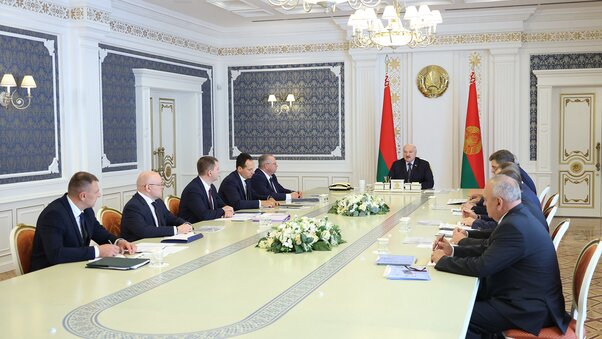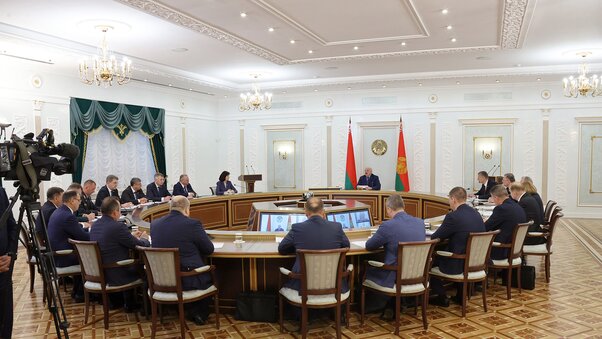Meeting to discuss performance of National Academy of Sciences of Belarus
- 9
- 10:35
Belarusian President Aleksandr Lukashenko hosted a meeting to review the performance of the National Academy of Sciences of Belarus (NASB) on 30 July.
Taking part in the meeting was a working group that was set up upon the instruction of the head of state to analyze the performance of the NASB in June 2024. It operates on a permanent basis and studies the applicability and effectiveness of research output by NASB, the use of their solutions in the economic and social sectors, the development of import-substituting products and technologies, and the export of science and engineering products. Every year, the working group will submit a report to the President where it will take stock of its work and lay out proposals for resolving identified issues.
The head of state emphasized in his opening remarks that Belarus is now at such a development stage when it is impossible to make any further progress without science. “Therefore, science is of paramount importance,” he noted. Belarus promotes both applied and fundamental research. Aleksandr Lukashenko explained why this working group was formed: “We assign a high priority to science, it is impossible to move forward without it. Yet, lately I have seen that the Academy of Sciences has made serious mistakes. Such things happen. Researchers have to go along unbeaten paths, wrap their head around serious problems, reach new heights. Therefore, naturally, mistakes happen. But what alarmed me was that the miscalculations made by the National Academy of Sciences were inexcusable, as they were made in the areas where we have some expertise: in animal breeding, in plant growing,” the President said.
According to the President, research centers run by the NASB are no better than similar facilities that operate outside the National Academy of Sciences. “But they should be the best,” the head of state emphasized.
The creation of the working group was prompted by appeals from some specialists and government members. “They urge me to take a serious look at the development of academic science and make decisions in all areas of research,” said Aleksandr Lukashenko.
According to the President, the work of the academic community gave rise to many questions: “There are some successes, along with serious disappointments.” The permanent working group is headed by the chairman of the State Control Committee. He was tasked with engaging credentialed experts in the work of the group and getting to the core of the issues facing the NASB.
As this group started working not so long ago, Aleksandr Lukashenko warned against rushing into conclusions and called for a detailed discussion of a wide range of tasks, goals and objectives of the group. “The conversation should proceed along these lines. I do not want the NASB senior officials and scientists in attendance to think that we are going after the National Academy of Sciences. We are not. We need to carefully study the problems facing the Academy of Sciences and make appropriate decisions, because we can’t proceed any further without science,” Aleksandr Lukashenko remarked.
The group should submit its first report at the end of the year, after which the decisions mentioned above will be made. If someone believes that it is necessary to take immediate action, the President invited them to speak up. “Don’t rush into conclusions. The issue is very serious,” the head of state advised.
Speaking about the development of science in general, the President emphasized: “We live in an era of unprecedented development opportunities for our country. Opportunities are huge. We cannot miss them. We have a solid base and certain expertise in traditional industries and new areas of the economy. Yet, it will be impossible to achieve another milestone without a real breakthrough in science. Science must be ahead of the curve, in no case should it lag behind,” the head of state emphasized.
According to Aleksandr Lukashenko, during his entire tenure as President, he has viewed science as a powerful driver of all transformations in the society.
“The development of domestic science is top on the list of the government priorities. We did not let our science and scientific solutions go down the drain. We did everything possible to preserve them.” The time has come to ask scientists to show results of their work, the President stated: “What fundamental, strategic solutions will we have under our belt as we will be drafting new medium- and long-term development programs? Are we capable of ensuring our technological sovereignty in the current conditions?”
According to the President, this is not only and not so much about sanctions. “We have already gotten used to them [the sanctions]. They are temporary. I am talking about the insanely rapid development of the world, especially Asia, the East. Yet, the West is not dragging its feet, either. The last NATO Summit declared “technological breakthrough” its fourth priority (up to the creation of central bodies at the Alliance level),” Aleksandr Lukashenko remarked.
“These are quantum technologies, artificial intelligence, biology and digital transformation. We should not lag behind,” the President went on saying.
The head of state emphasized that the government and society are on board regarding the importance of these tasks, which is evidenced from recent opinion polls. “When asked about the priorities of the country's development, Belarusians put high-tech industries that ensure a technological breakthrough and access to foreign markets, as well as high-tech industries in the agro-industrial complex in first place. This is a strategically correct approach. Roads, housing, education, culture, sports - all this will develop if we ensure high-tech competitive production in the country. It will have an impact on exports, salaries, taxes and the budget,” the President said.
According to Aleksandr Lukashenko, in order to be successful in new markets, it is necessary to do an in-depth market research and offer exactly those products that a particular market needs. University science, industry science and academic science should collaborate to achieve this goal. The efficiency of this collaboration is yet to be analyzed, the President noted. He warned against spreading resources and efforts thin given that Belarus is a relatively small country.
“The domestic science should drive the country's economy. That is, there should be an appreciable result for the state and people, especially at the present time,” the Belarusian leader demanded.
The President emphasized that he does not downplay the role of fundamental science. It allows looking beyond the horizon, which is also important, and this kind of science will develop in Belarus.
“But today applied research is coming to the forefront, as it can push the country forward,” the head of state emphasized.
Now the process of electing members of the Academy of Sciences is underway. The President noted that the major criteria is the importance of scientific developments for the state. It is also important to have your own school of intellectual tradition that attracts young people to science. "If there are no successors of ideas, there is no continuity, then there is no science," Aleksandr Lukashenko said.
"I fully support the proposals by the scientists to establish clear criteria for the selection of candidates for the rank of academicians and corresponding members. No nepotism and mutual cover-up, which science is often guilty of," the head of state said.
Then, according to him, elections will be held in accordance with the updated charter of the National Academy of Sciences of Belarus and the regulations on elections. "Nomination to the rank of academician and corresponding member should be based on real contribution to the domestic economy. Are our scientists at the forefront of solving strategic economic and social problems?" the President said.
"They say that science has no homeland. But scientists learn and reach certain heights as citizens of their own country. Most great scientists are true patriots. I will say more: a citizen who has the high status of a scientist should be the most active enforcer of the state policy," the head of state stressed. The President inquired about the state of affairs in the Academy of Sciences.


